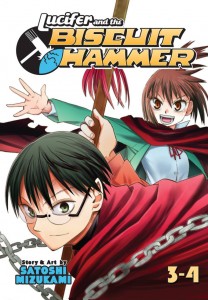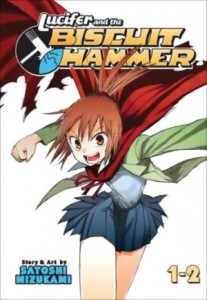By Satoshi Mizukami. Released in Japan by Shonen Gahosha, serialized in the magazine Young King Ours. Released in North America by Seven Seas.
I’ve discussed before how series can sometimes be plotted in “short/medium/long” ways in Japan. The short is if the series is a failure – 2-3 volumes and it’s done. Long is when a series is a huge hit and basically can run as long as the author needs or editors demand. And mid-sized tends to be in the 10-20 volume range, where it’s a big enough hit to get room to grow. Biscuit Hammer falls into the second category, and I am happy that it has its ten volumes (or 5 omnibuses). That said, sometimes you can hear the screeching noises as the author realizes it’s not going to be cancelled and rolls out the rest of the plot. Having spent the first two volumes keeping the focus primarily on three people, these next two add the entire rest of the cast, plus the villain over the space of only a few chapters. It can feel exhausting.
That said, the cast is not without interest. Seeing two middle-school girls as two of the knights is rather jarring, and I liked the determination of the oldest of the knights to keep them out the battles, even as that quickly becomes moot. We get what seems to be the standard ‘childhood friends with secret crushes’ pair, only to realize that the girl is not only odd but a little worrying – given what happened with the Dog Knight, I wonder if she’ll survive the book. There’s not just youngsters, though – a 42-year-old ex-cop is one of the knights, an agent for justice whose cynicism won’t let him believe in it anymore. And the Swordfish Knight, now dead, gets probably the best backstory of the group, though it starts off in a ridiculous manner.
Then there’s our villain, Animus – assuming you aren’t thinking that the villains are our two heroes, who have after all vowed to destroy the Earth as well. He seems the typical smiling villain – he’s already corrupted one of the Knights, and goes after a second, though he’s unsuccessful – but he’s too laid-back to really fall into that stereotype – indeed, that may be a bit more disturbing, as his calm placidity works even better. I liked his intellectual faceoff with the Cat Knight, whose smackdown that gaining knowledge just for the sake of having it is a useless goal.
Overall, though, much of this omnibus feels like setup – lampshaded by Animus, who calls off the attack golems about 1/3 of the way through the book so that the author can show off his new characters and give us their backstories. It’s nice to learn about them, even if some seem a bit underdeveloped still, such as the Snake Knight. But I didn’t enjoy this quite as much as the first omnibus due to the sound of the grinding gears I heard in the background as the author realized he now has room to stretch things out. I’m still very interested in seeing how things go, though, and the next volume looks likely to have more action, if the cliffhanger is anything to go by.



